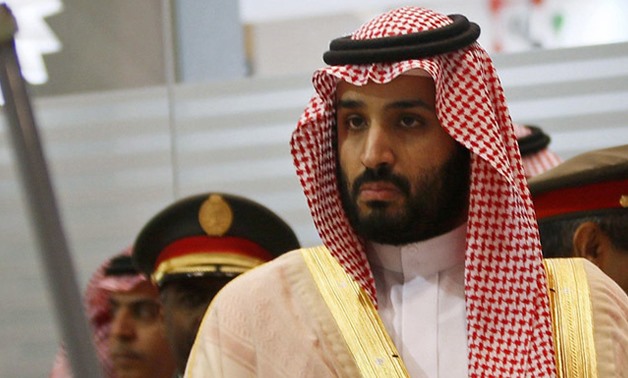
Crown Prince Mohamed bin Salman - Reuters
CAIRO – 21 June 2017: The world woke up Wednesday to a royal decree replacing Prince Mohamed bin Nayef as Crown Prince of Saudi Arabia with his cousin, the son of the current King of Saudi Arabia Salman bin Abdel Aziz, Prince Mohamed bin Salman.
Here is an overview of the life of Saudi Arabia’s new Crown Prince.
Prince Mohamed bin Salman was born August 31, 1985 in Jeddah and is the eldest son of King Salman bin Abdel Aziz, who was previously governor of Riyadh Province. He attended law school at King Saud University and graduated second on his class, according to Al Arabiya News.
In 2008, Prince Mohamed bin Salman, then aged 23, joined the cabinet-affiliated Experts Commission advising the government on technical financial issues. The prince relied on his experience in private sector finance, according to Business Insider UK.
The political career of Prince Mohamed bin Salman kicked off the following year when he became special advisor to his father, at the time governor of Riyadh, a position he held for 48 years. Later, Prince Mohamed was promoted to secretary-general of the Riyadh Competitive Council and to the board of trustees for the Albir Society in the Riyadh region within a year, according to Business Insider UK.
In 2011, King Salman was appointed Deputy Crown Prince, before his son became his special advisor in October of the same year. When in office, Prince Mohamed bin Salman established a foundation named after him to help disadvantaged youth.
In 2012, King Salman became Crown Prince, succeeding his deceased brother Prince Nayef bin Abdel Aziz Al-Saud. In parallel, his son Prince Mohamed bin Salman was appointed Chief of the Crown Prince Court, prior to his promotion as State Minister in 2014 at the age of 28, according to Business Insider UK.
Prince Mohamed bin Salman was appointed in January 2015 as Defense Minister at the age of 29, becoming the world’s youngest Defense Minister. That is in addition to his positions as state minister and secretary-general of the royal court.
That was following the death of King Abdullah and the coronation of his father, King Salman bin Abdel Aziz, as King of Saudi Arabia in April of the same year, Prince Mohamed bin Salman was appointed Crown Prince.
On March 26, 2015, airstrikes by an Arab coalition led by Saudi Arabia were launched against Houthis in Yemen and have continued to the present. In the same year, the United States sold smart bombs worth $1.29 billion to Saudi Arabia.
Since he has been in office, he met with many foreign officials to discuss bilateral relations, such as Russian President Vladimir Putin holding talks in 2015 on the Syrian crisis, according to Business Insider UK.
In January 4, 2016, the Economist interviewed Prince Mohamed bin Salman. The prince said he did not anticipate a war between Saudi Arabia and Iran because that would be “the beginning of a major catastrophe in the region, and it will reflect very strongly on the rest of the world.”
Prince Mohamed bin Salman added that the duration of airstrikes in Yemen is not predictable, declaring that 80 percent of the Yemeni territories are under the control of the legitimate government led by Abdrabbuh Mansur Hadi, who took office on February 25, 2012.
In the wake of the oil prices crisis that occurred last year, which resulted in a budget deficit in Saudi Arabia, the prince declared that the Saudi state is considering selling off infrastructure in order to generate $2 trillion “to make the country less dependent on oil,” according to Business Insider UK.
Commenting on the Saudi budget deficit amounting to 15 percent of the GDP in 2015 due the fall of oil prices to $35 per barrel, Prince Mohamed bin Salman announced that his country is far from an economic crisis, having the third-largest reserves in the world.
The prince is leading a package of economic reforms guaranteeing further sustainability and self-efficiency in the Saudi economy.
Saudi Arabia was able to increase its non-oil revenues in 2016 by 29 percent and its debt to GDP ratio was 5 percent. Prince Mohamed bin Salman stated that the country has a five-year plan, in addition to its well-established global economic network.
Prince Mohamed bin Salman said Saudi Arabia can generate revenues of $100 billion in five years through its unutilized assets such as lands which can be used for investment, natural resources other than oil, such as uranium, with the country having more than six percent of world reserves of the metal, and a VAT tax that will be implemented on January 1, 2018 with basic goods, such as water and dairy, being exempted.
Prince Mohamed bin Salman stressed that no income or wealth taxes will be imposed. Regarding further privatization, the prince said the sectors included are “health care, educational sector, some military sectors such as military industries and some state-owned companies.” In addition, he declared the Saudi state’s intention is to support the 80 percent of low income citizens who do not receive subsidies while canceling out other lavish subsidies such as those on energy.
Prince Mohamed bin Salman estimated the ARAMCO IPO likely taking place next year to be a $2 trillion of value for 5 percent of the company’s shares, according to Market Watch.
Prince Mohamed bin Salman stated that he supports the integration of women into the labor force, which would increase the productivity of the countries’ human resources.

Comments
Leave a Comment